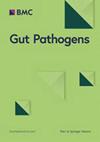佩兹-杰格尔斯综合征患者粘膜细菌和代谢组学的改变
IF 4.3
3区 医学
Q1 GASTROENTEROLOGY & HEPATOLOGY
引用次数: 0
摘要
佩兹-杰格尔斯综合征(Peutz-Jeghers Syndrome,PJS)是一种罕见的遗传性疾病,以出现色素斑、胃肠道息肉和癌症易感性增加为特征。目前,大多数研究都是通过粪便微生物群来调查肠道微生物群,有关粘膜相关微生物群的报道很少。寻找与 PJS 相关的关键肠道微生物群或异常代谢途径仍然很有价值。本研究旨在评估 PJS 患者粘膜相关微生物群的结构和组成,并探讨肠道微生物群紊乱和代谢物变化对 PJS 的潜在影响。研究采用 16S rRNA 基因测序技术(Illumina MiSeq)分析了 13 名 PJS 患者和 12 名对照组的细菌组成。对肠道微生物群进行了从门到种的差异分析。液相色谱-串联质谱法(LC-MS)用于检测 PJS 患者和对照组中不同含量的代谢物,以确定小肠粘膜样本中不同的代谢物和代谢生物标志物。高通量测序证实了 PJS 患者粘膜微生物菌群的特殊性和生物多样性。他们的细菌生物多样性低于对照组。肠粘膜微生物菌群的丰度明显低于粪便微生物菌群。此外,脂质代谢、氨基酸代谢、碳水化合物代谢、核苷酸代谢等途径与对照组有显著差异,这与肠道神经系统的发育、肠道炎症和肿瘤的发生有关。这是第一份关于 PJS 患者粘膜相关微生物群和代谢物谱的报告,可能为进一步研究 PJS 肠道微生态提供结构基础。本文章由计算机程序翻译,如有差异,请以英文原文为准。
Altered mucosal bacteria and metabolomics in patients with Peutz–Jeghers syndrome
Peutz–Jeghers syndrome (PJS) is a rare genetic disorder characterized by the development of pigmented spots, gastrointestinal polyps and increased susceptibility to cancers. Currently, most studies have investigated intestinal microbiota through fecal microbiota, and there are few reports about mucosa-associated microbiota. It remains valuable to search for the key intestinal microbiota or abnormal metabolic pathways linked to PJS. This study aimed to assess the structure and composition of mucosa-associated microbiota in patients with PJS and to explore the potential influence of intestinal microbiota disorders and metabolite changes on PJS. The bacterial composition was analyzed in 13 PJS patients and 12 controls using 16S rRNA gene sequencing (Illumina MiSeq) for bacteria. Differential analyses of the intestinal microbiota were performed from the phylum to species level. Liquid chromatography-tandem mass spectrometry (LC‒MS) was used to detect the differentially abundant metabolites of PJS patients and controls to identify different metabolites and metabolic biomarkers of small intestinal mucosa samples. High-throughput sequencing confirmed the special characteristics and biodiversity of the mucosa microflora in patients with PJS. They had lower bacterial biodiversity than controls. The abundance of intestinal mucosal microflora was significantly lower than that of fecal microflora. In addition, lipid metabolism, amino acid metabolism, carbohydrate metabolism, nucleotide metabolism and other pathways were significantly different from those of controls, which were associated with the development of the enteric nervous system, intestinal inflammation and development of tumors. This is the first report on the mucosa-associated microbiota and metabolite profile of subjects with PJS, which may be meaningful to provide a structural basis for further research on intestinal microecology in PJS.
求助全文
通过发布文献求助,成功后即可免费获取论文全文。
去求助
来源期刊

Gut Pathogens
GASTROENTEROLOGY & HEPATOLOGY-MICROBIOLOGY
CiteScore
7.70
自引率
2.40%
发文量
43
期刊介绍:
Gut Pathogens is a fast publishing, inclusive and prominent international journal which recognizes the need for a publishing platform uniquely tailored to reflect the full breadth of research in the biology and medicine of pathogens, commensals and functional microbiota of the gut. The journal publishes basic, clinical and cutting-edge research on all aspects of the above mentioned organisms including probiotic bacteria and yeasts and their products. The scope also covers the related ecology, molecular genetics, physiology and epidemiology of these microbes. The journal actively invites timely reports on the novel aspects of genomics, metagenomics, microbiota profiling and systems biology.
Gut Pathogens will also consider, at the discretion of the editors, descriptive studies identifying a new genome sequence of a gut microbe or a series of related microbes (such as those obtained from new hosts, niches, settings, outbreaks and epidemics) and those obtained from single or multiple hosts at one or different time points (chronological evolution).
 求助内容:
求助内容: 应助结果提醒方式:
应助结果提醒方式:


